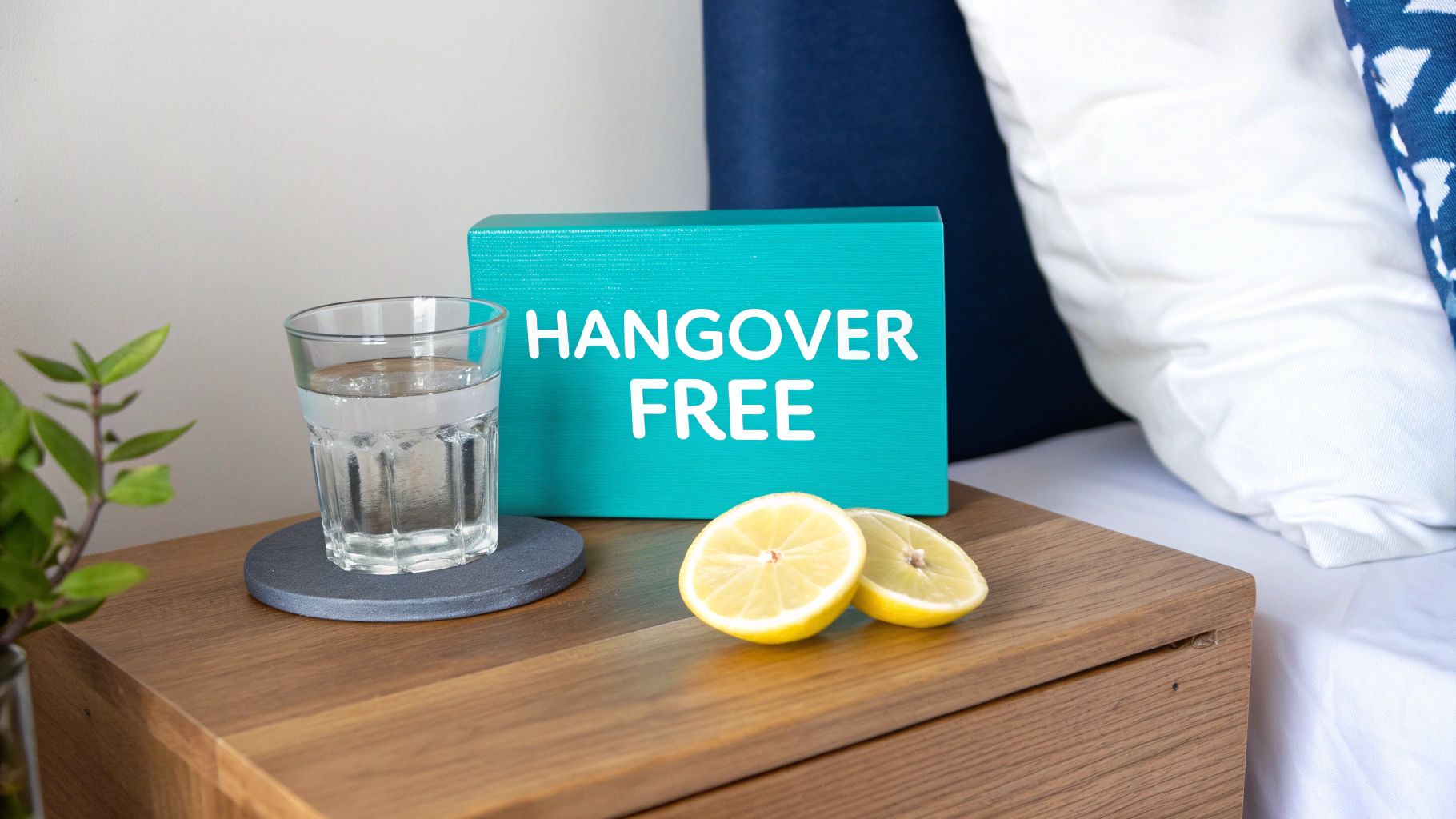

· By Annemarie
How to Avoid Hangover: 5 Expert Tips for a Better Morning
Conquer the Morning After: Your Guide to Hangover-Free Fun
Hangovers can derail your productivity and well-being. This listicle provides actionable strategies to avoid hangovers altogether, so you can enjoy social events without sacrificing the next day. Learn how to strategically hydrate, choose the right foods and drinks, pace yourself, and support your body's natural recovery process. We'll cover everything from pre-drinking preparation to morning-after routines. While some products promise hangover relief, this guide focuses on prevention – a more effective approach to truly conquer the morning after. Discover how to avoid a hangover and wake up refreshed.
1. Hydration Strategy
One of the most effective strategies for how to avoid a hangover is surprisingly simple: hydration. The hydration strategy focuses on maintaining optimal water levels in your body before, during, and after alcohol consumption to combat its dehydrating effects. Alcohol is a diuretic, meaning it increases urination and fluid loss. This dehydration contributes significantly to common hangover symptoms like headaches, fatigue, and dry mouth. By proactively hydrating, you can significantly reduce the severity of these symptoms.
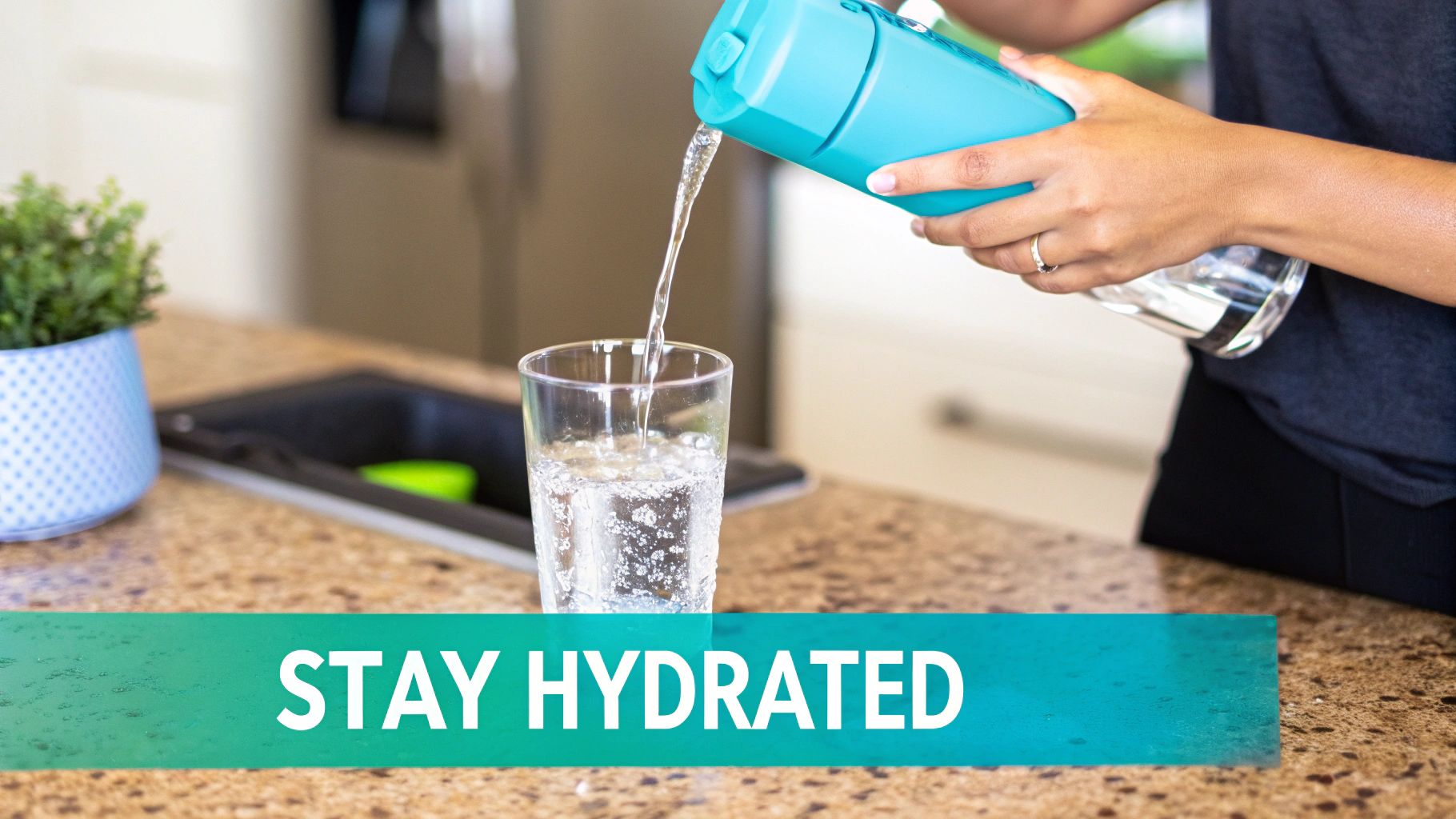
This method deserves a top spot on the list because it's easy to implement, scientifically supported, and cost-effective, offering immediate relief for some symptoms. The hydration strategy involves several key features: alternating alcoholic beverages with water, pre-hydration before you start drinking, rehydration before sleep, and electrolyte replacement. For example, the "1:1 rule"—drinking one glass of water for every alcoholic drink—is a simple yet effective way to pace yourself and stay hydrated. Athletes who incorporate alcohol into their social lives often utilize oral rehydration solutions to replenish lost electrolytes, and medical professionals routinely recommend drinking 16-20 ounces of water before bed after consuming alcohol.
While other hangover "cures" may make unsubstantiated claims or offer temporary fixes, prioritizing hydration tackles the root cause of many hangover symptoms. Learn more about Hydration Strategy
Here are some actionable tips to integrate the hydration strategy into your routine:
- Keep a water bottle handy: Having water readily available makes it easier to stay hydrated throughout the night.
- Set reminders on your phone: If you anticipate getting caught up in the moment, set reminders to drink water regularly.
- Add electrolytes to water: Electrolyte solutions or tablets can enhance water absorption and replace essential minerals lost through alcohol consumption. Consider coconut water as a natural electrolyte source.
- Drink a large glass of water before going to sleep: This helps replenish fluids lost throughout the night.
Pros:
- Easy to implement
- Scientifically supported
- Cost-effective
- Provides immediate relief for some symptoms
Cons:
- Requires discipline while drinking
- May increase bathroom trips
- Not a complete solution on its own (although far more effective than many competitor's suggestions)
- Can be difficult to remember as intoxication increases
Whether you're a social drinker, a nightlife enthusiast, health-conscious, a busy professional, or a frequent traveler, the hydration strategy is a crucial tool for minimizing hangovers and maximizing your enjoyment. By proactively hydrating, you can mitigate the negative effects of alcohol and wake up feeling refreshed.
2. Food Before Alcohol Consumption
One of the most effective strategies for avoiding a hangover is consuming a substantial meal before you start drinking. This pre-emptive approach works by slowing the absorption of alcohol into your bloodstream. When you have food in your stomach, alcohol remains there longer, allowing it to be partially broken down before it enters the small intestine, where the majority of absorption occurs. This slows the rate at which alcohol reaches your bloodstream and reduces the peak blood alcohol concentration (BAC), a key factor in hangover severity. This method is particularly effective for managing blood alcohol levels and offering stomach lining protection against the irritant effects of alcohol.
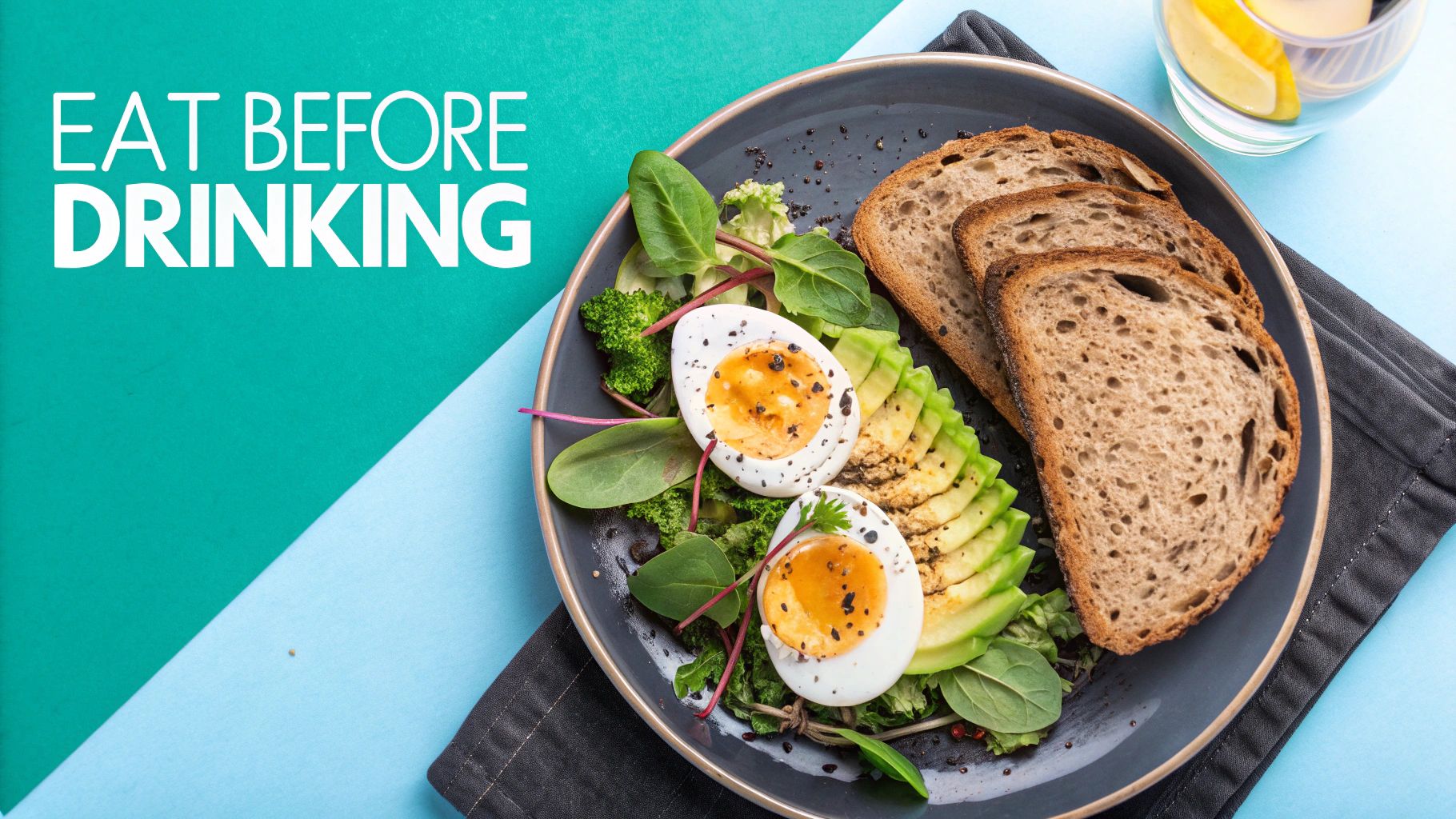
Prioritizing protein, healthy fats, and complex carbohydrates in your pre-drinking meal is key. These nutrients are particularly effective at slowing alcohol absorption. Protein and fat create a sort of protective barrier in the stomach, while complex carbohydrates provide sustained energy and help regulate blood sugar levels, which can fluctuate when drinking. This approach deserves its place on this list due to its proactive nature and proven effectiveness in mitigating the negative effects of alcohol. It’s a simple, accessible strategy anyone can implement to minimize the chances of a hangover.
Examples of successful implementation can be found in various cultures around the world. The Mediterranean diet, rich in olive oil, lean proteins, and whole grains, provides an excellent blueprint for a pre-drinking meal. Think of the Spanish tradition of tapas – small, flavorful dishes enjoyed alongside alcoholic beverages – as a practical application of this principle. Similarly, the Nordic tradition of consuming fatty fish before drinking sessions highlights the importance of healthy fats in mitigating alcohol absorption.
Tips for Optimizing Your Pre-Drinking Meal:
- Dairy Protection: Consume yogurt or milk products to create a protective lining in the stomach.
- Complex Carbs are Key: Choose complex carbohydrates like whole-grain bread, pasta, or brown rice.
- Healthy Fats are Essential: Include healthy fats such as avocado, nuts, or olive oil in your meal.
- Never Drink on an Empty Stomach: This is crucial for avoiding rapid alcohol absorption and potential negative effects.
- Avoid Salty Foods: Salty snacks can increase thirst and lead to consuming more alcohol than intended.
Pros and Cons of Eating Before Drinking:
Pros:
- Slows alcohol absorption rate
- Reduces peak blood alcohol level
- Protects stomach lining
- Can enhance the overall drinking experience by preventing rapid intoxication
Cons:
- May lead to excessive calorie intake if not planned carefully
- Requires specific food choices for effectiveness
- Timing is critical; eating after drinking has commenced is largely ineffective
While some other hangover remedies might offer quick fixes or claim miraculous results, this method focuses on a proactive approach that tackles the root cause of hangovers: rapid alcohol absorption. By prioritizing a pre-drinking meal rich in the right nutrients, you take control of your drinking experience and significantly reduce your chances of waking up with a hangover. This approach, rooted in science and supported by cultural traditions, empowers you to enjoy alcohol responsibly and minimize its negative consequences. This is especially valuable for social drinkers, nightlife enthusiasts, health-conscious individuals, busy professionals, and frequent travelers who need to stay sharp and productive.
3. Strategic Alcohol Selection
Want to enjoy a night out without the dreaded next-day hangover? How you choose your drinks plays a crucial role. Strategic alcohol selection focuses on minimizing hangover severity by understanding how different types of alcohol affect your body. This involves considering the concentration of congeners, which are toxic byproducts formed during fermentation. Clear spirits like vodka, gin, and white rum generally have lower congener content compared to darker spirits like whiskey, bourbon, and red wine. This difference in congener content is often cited as a reason why darker spirits are associated with more intense hangovers. Additionally, sugary mixers and carbonated beverages can exacerbate hangover symptoms, so making smart choices in this area is also key.
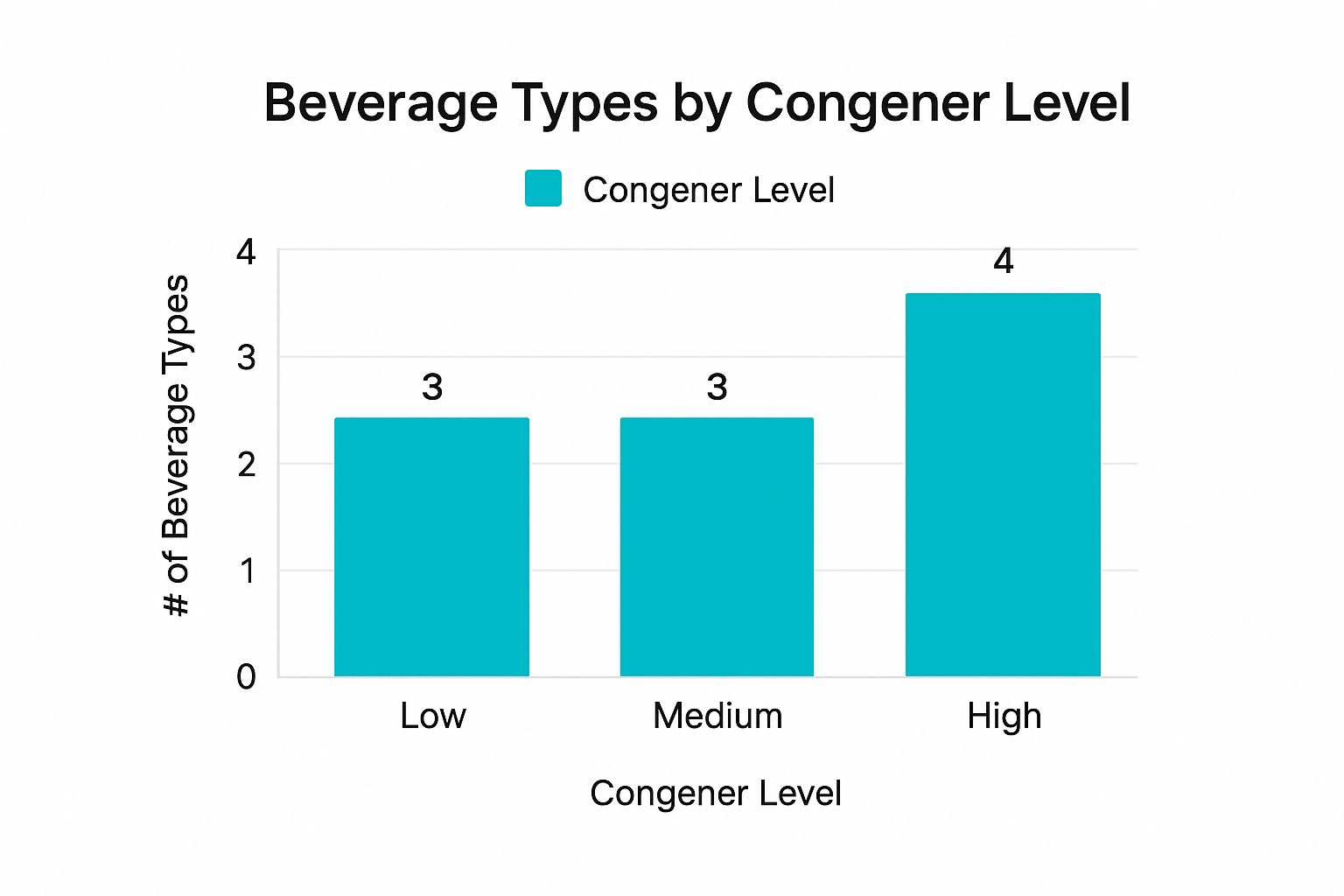
The infographic above provides a visual representation of congener content in various alcoholic beverages. As the chart demonstrates, drinks like rum, whiskey, and red wine contain significantly higher levels of congeners compared to vodka, gin, and white wine. This visual comparison underscores the importance of considering congener levels when choosing your drinks to avoid a hangover. For example, the chart clearly shows that opting for vodka over whiskey can significantly reduce your congener intake.
This approach deserves a place on this list because it empowers you to make informed decisions about your alcohol consumption without necessarily requiring you to drink less. It’s about making smarter choices, not necessarily fewer drinks. This is particularly beneficial for social drinkers, nightlife enthusiasts, and busy professionals who want to enjoy social events without sacrificing the next day. Even health-conscious individuals and frequent travelers can benefit from this strategy, as it allows them to indulge occasionally while minimizing potential negative consequences.
Features of Strategic Alcohol Selection:
- Clear vs. Dark Spirits Consideration: Prioritizing clear spirits over dark ones.
- Congener Content Awareness: Understanding and considering the impact of congeners.
- Quality over Quantity Approach: Opting for higher-quality alcohols, even if it means drinking slightly less.
- Mixer Selection Strategy: Choosing mixers that won't worsen hangover symptoms.
Pros:
- Can reduce hangover severity without drastically reducing alcohol intake.
- Offers flexibility in drink choices.
- Backed by scientific evidence regarding congeners.
- Can enhance drinking enjoyment by focusing on quality.
Cons:
- Higher-quality alcohols can be more expensive.
- Personal preferences might conflict with optimal choices.
- Not as effective as moderation.
- Effectiveness varies by individual.
Examples of Successful Implementation:
- Choosing vodka or gin over whiskey or cognac.
- Selecting a premium tequila over cheaper varieties.
- Opting for wine spritzers or cocktails with fresh juice instead of sugary pre-made mixes.
- Avoiding drinks with multiple alcohol types, such as Long Island Iced Teas.
Actionable Tips for Avoiding a Hangover Through Strategic Alcohol Selection:
- Go Clear: Choose vodka, gin, or quality tequila over whiskey, cognac, or bourbon.
- Upgrade Your Alcohol: Select higher-quality alcohol brands that utilize better filtration processes, potentially reducing congeners.
- Mix Smart: Use fresh juice, soda water, or light tonic instead of sugary mixers.
- Beware of Bubbles: Be cautious with champagne and carbonated mixers, which can speed up alcohol absorption.
- Hydrate: Drink plenty of water throughout the night and before going to bed. This is a crucial step regardless of your alcohol choices.
By understanding the role of congeners and smart mixer selection, you can take control of your drinking experience and minimize the chances of a debilitating hangover. While this method isn't a foolproof guarantee, it offers a practical and scientifically-backed approach to enjoying alcohol more responsibly. This method, combined with other hangover prevention strategies, can greatly improve your overall well-being after a night out.
4. Pacing and Moderation Techniques
One of the most effective strategies for how to avoid a hangover lies in controlling both how much and how quickly you consume alcohol. This approach, known as pacing and moderation, allows your body to metabolize alcohol more efficiently, preventing the rapid buildup of toxins that contribute to those dreaded next-day symptoms. By employing specific behavioral techniques to slow your consumption and set limits, you can significantly reduce your hangover risk while still enjoying social drinking situations.
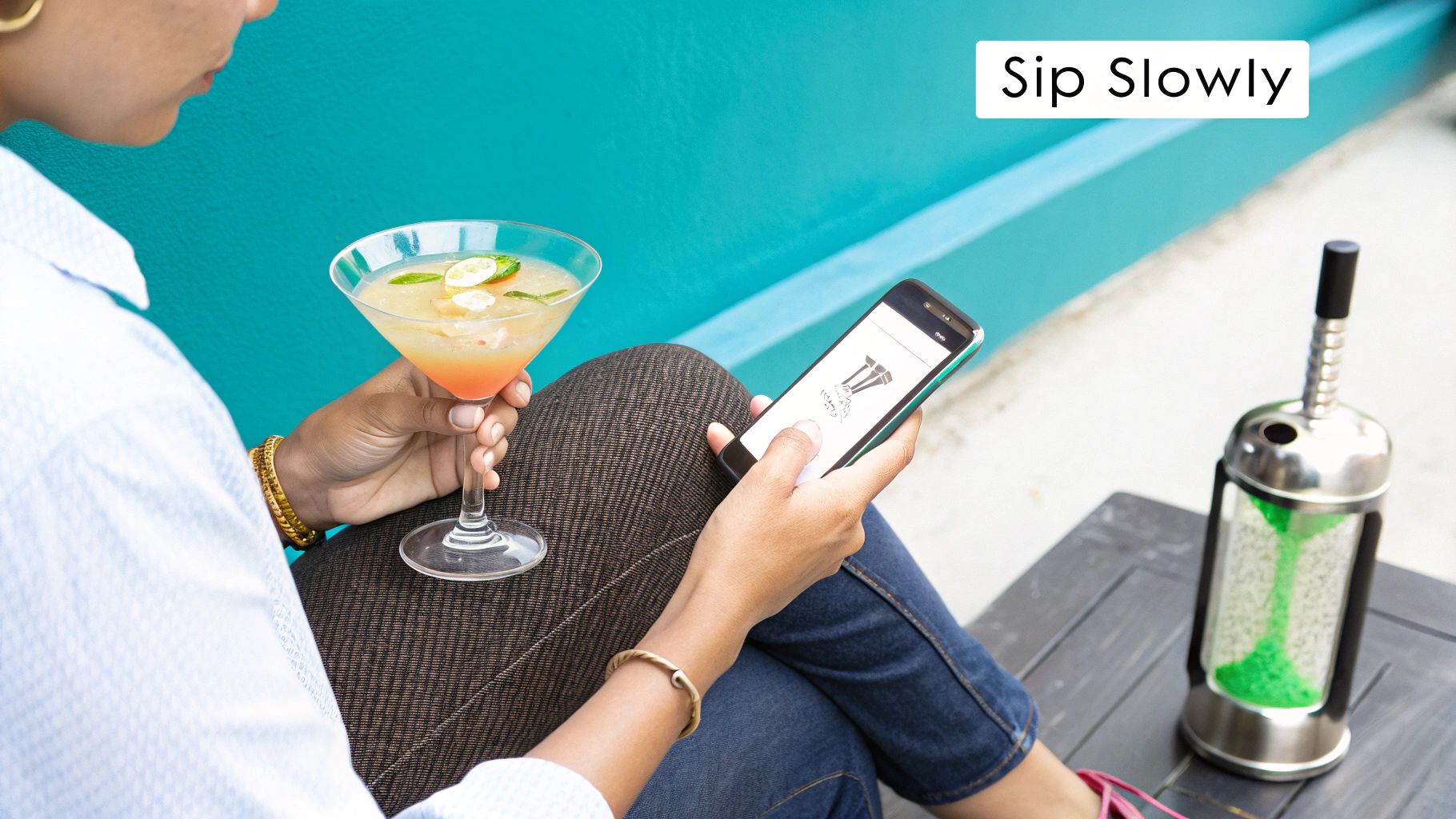
This method works because your liver can only process a limited amount of alcohol per hour. Exceeding this limit leads to a rapid increase in your Blood Alcohol Concentration (BAC), which is directly correlated with hangover severity. Pacing and moderation techniques help keep your BAC within a manageable range. Learn more about Pacing and Moderation Techniques
There are various practical ways to implement this strategy. Examples include the 0-1-2-3 rule (0 drinks when pregnant, a maximum of 1 drink daily for women, 2 for men, and 3 on occasions), the Swedish 'one-in-one-out' approach where a new drink is only ordered after finishing the previous one, and the Australian standard drinks counting method. These methods offer structured guidelines for managing your intake.
While many apps and programs offer similar advice, focusing on pacing and moderation provides a more sustainable and personalized approach to enjoying alcohol responsibly.
Here are some actionable tips to help you pace yourself and drink in moderation:
- Set a drink limit: Before you go out, decide on a maximum number of drinks you'll consume.
- Use a drink tracking app: Apps like DrinkControl or AlcoDroid can help you monitor your consumption in real-time.
- Choose lower alcohol content options: Opt for session beers or wine spritzers instead of high ABV craft beers or cocktails.
- Take sips, not gulps: Savor your drink and avoid downing it quickly.
- Have a designated 'pace person': Ask a friend in your group to help you stick to your plan.
- Set a spending limit: This acts as an indirect control on the number of drinks you can purchase.
Pros of Pacing and Moderation:
- Reduces overall alcohol consumption
- Allows your body to process alcohol more efficiently
- Maintains better decision-making ability
- Compatible with social situations
Cons of Pacing and Moderation:
- Requires self-discipline
- May face social pressure to drink faster
- Needs planning ahead
- May feel like it reduces spontaneity
Pacing yourself and drinking in moderation can significantly reduce the severity of a hangover. For those looking to explore sobriety or reduce their alcohol consumption overall, checking out resources with science-proven sobriety tips can be beneficial. Ultimately, managing your alcohol intake through pacing and moderation is a key component of enjoying alcohol responsibly and minimizing the negative consequences.
5. Nutritional Supplementation: A Proactive Approach to Avoiding Hangovers
Waking up with a pounding headache, nausea, and fatigue after a night out is a common experience, but it doesn't have to be. Nutritional supplementation offers a proactive approach to minimizing or even preventing hangovers, helping you feel your best the next day. This involves strategically using specific vitamins, minerals, and supplements before, during, or after alcohol consumption to support your body's natural detoxification processes and replenish lost nutrients. This method deserves a place on this list because it addresses the root causes of hangover symptoms, offering targeted support rather than just masking the discomfort.
Alcohol depletes essential nutrients and puts a strain on the liver, leading to the unpleasant cascade of hangover symptoms. Nutritional supplementation aims to mitigate these effects by:
- Supporting Liver Function: The liver is your body's primary detoxification organ, working overtime to process alcohol. Supplements like milk thistle, traditionally used for liver support, can help bolster this vital organ.
- Reducing Inflammation: Alcohol consumption can trigger inflammation throughout the body, contributing to hangover symptoms. Certain supplements possess anti-inflammatory properties that can help counteract these effects.
- Addressing Nutritional Imbalances: Alcohol disrupts the body's delicate nutrient balance, exacerbating hangover symptoms. Replenishing these lost nutrients through supplementation can help restore equilibrium and alleviate discomfort.
Features of this approach include:
- Pre-drinking supplementation: Taking certain supplements before you start drinking can help prepare your body for alcohol's impact.
- Morning-after recovery support: Other supplements can help replenish depleted nutrients and ease lingering symptoms the next morning.
- Liver support formulations: Targeted supplements can specifically support liver function and detoxification processes.
- Anti-inflammatory compounds: Supplements with anti-inflammatory properties can help reduce the overall burden on your system.
Examples of this in action include:
- Studies have shown that consuming Korean pear juice before drinking can reduce hangover severity.
- DHM (Dihydromyricetin), derived from the oriental raisin tree, is another supplement gaining popularity for its potential hangover-reducing effects.
Actionable tips for incorporating nutritional supplementation into your routine:
- Take B-complex vitamins before drinking and the morning after.
- Consider N-acetyl-cysteine (NAC) before drinking to boost glutathione production, a potent antioxidant crucial for detoxification.
- Use magnesium supplements to address electrolyte imbalance.
- Try ginger supplements for nausea relief.
- Consider milk thistle for liver support.
Learn more about Nutritional Supplementation
While various hangover prevention supplements like 'Flyby', 'DHM Detox', and 'Morning Recovery' have entered the market, and while wellness influencers often promote various natural remedies, it's essential to prioritize quality and consult with a healthcare professional before starting any new supplement regimen. These pre-packaged supplements may not always offer the most effective or tailored approach. We believe a more informed approach to supplementation, focusing on specific nutrients and their individual benefits, can be a safer and more effective way to avoid a hangover.
Pros of Nutritional Supplementation:
- Targets specific biochemical pathways affected by alcohol
- Can be used preventatively
- Addresses multiple hangover mechanisms
- Relatively easy to incorporate into your routine
Cons of Nutritional Supplementation:
- Quality and effectiveness vary between products.
- Scientific evidence is mixed for some supplements.
- Can be expensive.
- Not a substitute for moderation.
- May interact with medications.
Remember, while nutritional supplementation can be a valuable tool in how to avoid a hangover, it's most effective when combined with mindful drinking habits. Moderation is key, and no supplement can entirely counteract the effects of excessive alcohol consumption.
6. Sleep Optimization Strategy
Waking up with a pounding head and a churning stomach after a night of fun is a familiar experience for many. While no magic bullet exists to completely eliminate hangovers, optimizing your sleep after consuming alcohol can drastically reduce their severity. This strategy deserves its place on the "how to avoid hangover" list because it addresses one of the root causes of those unpleasant symptoms: alcohol's disruptive effect on sleep, particularly REM sleep, which is essential for restoration.
Alcohol interferes with your natural sleep architecture, leading to fragmented and less restorative sleep. This contributes to the fatigue, cognitive impairment, and general malaise associated with hangovers. By implementing a sleep optimization strategy, you can mitigate these negative effects and wake up feeling significantly better.
How it Works:
This approach focuses on maximizing both sleep quality and quantity after alcohol consumption. This involves several key features:
- Alcohol Timing Management: Strategically timing your alcohol intake to allow sufficient time for your body to metabolize it before bedtime is crucial.
- Sleep Environment Optimization: Creating a conducive sleep environment helps promote deeper and more restful sleep.
- Sleep Duration Extension: Allowing yourself extra sleep time after drinking gives your body more time to recover.
- REM Sleep Recovery Techniques: While not directly controllable, some strategies can indirectly support better REM sleep.
Examples of Successful Implementation:
Cultures around the world have recognized the link between sleep and alcohol recovery. The Finnish tradition of a sauna before sleep after drinking is believed to improve sleep quality. Some tech companies are even incorporating "sleep pods" for employee recovery after events, recognizing the importance of rest and recuperation. The Japanese practice of drinking water and light stretching before bed after alcohol consumption similarly aims to aid restful sleep.
Actionable Tips for You:
- Stop drinking at least 3-4 hours before bedtime: This allows your body time to process the alcohol.
- Create a cool, dark sleeping environment: This promotes melatonin production, a key sleep hormone.
- Use a white noise machine to improve sleep quality: This can mask disruptive noises that could fragment your sleep.
- Avoid screens for an hour before sleep: The blue light emitted from screens interferes with melatonin production.
- Allow for extra sleep time after drinking: Even an extra hour or two can make a difference.
- Consider a small carbohydrate snack before bed to stabilize blood sugar: Alcohol can disrupt blood sugar levels, which can interfere with sleep.
Pros and Cons:
Pros:
- Addresses one of the primary causes of hangover symptoms.
- Combines well with other hangover prevention strategies.
- Provides benefits beyond hangover prevention, such as improved overall sleep quality.
- No additional cost.
Cons:
- Requires advance planning.
- May be difficult in social situations that run late.
- Alcohol fundamentally disrupts sleep regardless of tactics.
- Other factors (stress, underlying sleep disorders) may interfere with sleep quality.
When and Why to Use This Approach:
This strategy is beneficial whenever you consume alcohol, especially if you’re prone to hangovers. By prioritizing sleep, you're actively investing in your well-being and minimizing the negative consequences of alcohol. While other hangover “cures” might promise quick fixes, sleep optimization addresses the core issue of physiological recovery. This focus on a foundational aspect of health sets this method apart. We believe in empowering individuals with sustainable and healthy habits, not just temporary patches.
This strategy, when combined with other sensible approaches, can significantly improve your experience after drinking. Focus on these proactive steps to minimize discomfort and maximize enjoyment the next day.
7. Morning Recovery Protocol
While the best way to avoid a hangover is to moderate alcohol consumption or abstain altogether, sometimes celebrations (or just life) happen. When you find yourself facing the unpleasant aftermath of a night out, a structured Morning Recovery Protocol can be your saving grace. This approach focuses on how to avoid hangover symptoms once they've already set in, minimizing their duration and severity. It deserves its place on this list because even the most diligent planner can occasionally overindulge, and having a reliable recovery strategy is essential.
This protocol works by addressing multiple hangover mechanisms simultaneously:
- Hydration Restoration: Alcohol is a diuretic, leading to dehydration, a major contributor to hangover symptoms. Replenishing fluids and electrolytes is crucial.
- Nutrient Replenishment: Alcohol depletes essential vitamins and minerals. This protocol aims to restore these lost nutrients.
- Anti-inflammatory Tactics: Alcohol triggers inflammation throughout the body. Addressing this inflammation can alleviate discomfort.
- Gentle Detoxification Support: While the liver naturally processes alcohol, this protocol aims to support this process without adding further strain.
Examples of Successful Implementation:
Cultural hangover cures offer insights into effective recovery strategies. Think of the "Full English Breakfast," providing protein and carbohydrates, or traditional Mexican menudo soup, rich in electrolytes and soothing spices. While these examples offer relief, a personalized Morning Recovery Protocol allows for tailored intervention.
Actionable Tips for Your Own Morning Recovery Protocol:
- Hydration First: Start with small sips of an electrolyte solution (or even plain water) before attempting food. Avoid sugary drinks which can worsen dehydration.
- Gentle Movement: A short walk in fresh air can increase oxygen flow and help your body process toxins.
- Nausea Relief: Ginger tea or candied ginger can settle your stomach.
- Strategic Caffeine: A small amount of caffeine can help with headaches, but avoid excessive amounts as it can further dehydrate you.
- Soothing Shower: Alternate between lukewarm and cool water in the shower to improve circulation and reduce inflammation.
- Nourishing Food: Choose easily digestible carbohydrates paired with protein. Toast with eggs, oatmeal with nuts, or a simple chicken and rice soup are good options.
- Pain Relief: Opt for ibuprofen instead of acetaminophen (e.g., Tylenol), as the latter can stress the already burdened liver.
When and Why to Use This Approach:
Implement your Morning Recovery Protocol as soon as you wake up with hangover symptoms. While preventative measures are always the best approach to avoid a hangover altogether, this protocol offers a structured way to mitigate the effects once they’ve begun.
Pros and Cons:
Pros:
- Effective even after a hangover has started.
- Addresses multiple hangover mechanisms simultaneously.
- Can be customized based on symptom severity.
- Uses readily available remedies.
Cons:
- Less effective than preventative approaches.
- Recovery takes time, regardless of interventions.
- Some components (like food) may temporarily worsen nausea if severe.
- Requires effort when you're feeling your worst.
While services like "The Hangover Club" and "The IV Doc" have popularized quick-fix intravenous hydration, these options can be costly and inconvenient. Developing your own personalized Morning Recovery Protocol empowers you to manage hangover symptoms effectively using accessible and affordable strategies within the comfort of your own home. By focusing on rehydration, nutrient replenishment, and gentle self-care, you can navigate the unpleasantness of a hangover and get back to feeling your best.
8. Medication and Pharmaceutical Approach
While the best way to avoid a hangover is to moderate alcohol consumption or abstain altogether, sometimes overindulgence happens. If you're looking for ways to mitigate the after-effects of a night out, a medication and pharmaceutical approach can offer targeted relief. This method involves using specific over-the-counter (OTC) or prescription medications to address key physiological processes involved in hangover development. This section will explore how this approach can help you avoid a hangover, though it's crucial to remember that it should not be a substitute for responsible drinking.
Alcohol can trigger inflammation, irritate the stomach, and cause dehydration, all contributing to that dreaded morning-after feeling. Pharmaceutical interventions can target these specific issues. For example, anti-inflammatory medications can help reduce overall discomfort, while acid reducers can soothe an upset stomach. Anti-nausea medications can combat queasiness, and careful caffeine management can help address headache and fatigue without exacerbating dehydration.
Examples of this approach in different cultures highlight the long-standing practice of using readily available ingredients for hangover relief. In Korea, hutgae (raisin tree) extract is sometimes consumed before drinking. The Japanese often consume umeboshi (pickled plum) with alcohol, believed to aid digestion and reduce nausea. Even bartenders have been known to use antacids before their shifts as a preventative measure.
Pros of this approach:
- Targeted Relief: Address specific symptoms like headache, nausea, and inflammation.
- Fast Acting: Many OTC medications provide relatively quick relief.
- Well-Understood Mechanisms: The way these medications work is generally well-researched.
- Accessibility: Many suitable options are readily available at your local pharmacy.
Cons of this approach:
- Medication Interactions: Mixing alcohol with certain medications can be dangerous and even cause liver damage. Never mix alcohol with acetaminophen (Tylenol).
- Potential Liver Damage: Some medications, especially when combined with alcohol, can strain the liver.
- Masking Symptoms: Medications may temporarily relieve symptoms without addressing the underlying cause – dehydration and the toxic effects of alcohol.
- Dependency: Relying solely on medication can discourage healthier preventative measures like moderation and hydration.
- Prolonged Alcohol Clearance: Some medications can interfere with the body's natural alcohol processing, potentially prolonging its effects.
Actionable Tips for Using Medication Wisely:
- Timing is Key: Take NSAIDs like ibuprofen after alcohol has been metabolized, never while drinking.
- Avoid Acetaminophen: Absolutely do not take acetaminophen (Tylenol) while alcohol is in your system due to severe liver toxicity risks.
- Consider Bismuth Subsalicylate: Pepto-Bismol can help with stomach upset and nausea.
- Caution with Antihistamines: While they might seem helpful for sleep, they can worsen dehydration.
- Food Matters: Take medication with food to minimize stomach irritation.
This method deserves a place on this list because it offers a practical, albeit reactive, approach to managing hangover symptoms. However, it's essential to use this method responsibly and prioritize preventative strategies. While certain companies market "hangover pills," it's crucial to consult with a healthcare professional for personalized advice and avoid self-medicating. Remember, the safest and most effective way to avoid a hangover is to drink responsibly and stay hydrated. This approach should be considered a last resort, not a primary strategy, and should be implemented with caution and awareness of the potential risks.
8 Strategies to Prevent Hangovers Comparison
| Strategy | Implementation Complexity 🔄 | Resource Requirements ⚡ | Expected Outcomes 📊 | Ideal Use Cases 💡 | Key Advantages ⭐ |
|---|---|---|---|---|---|
| Hydration Strategy | Low - simple routines, needs discipline | Low - water & electrolytes | Moderate - reduces dehydration symptoms | Before, during, and after drinking | Easy, cost-effective, immediate symptom relief |
| Food Before Alcohol Consumption | Medium - meal planning & timing needed | Medium - access to specific foods | Moderate - slows alcohol absorption | Pre-drinking meal setup | Protects stomach lining, reduces peak BAC |
| Strategic Alcohol Selection | Medium - informed drink choices | Medium to high - quality alcohol | Moderate - less severe hangovers | Choosing drinks before or during events | Reduces hangover severity without reducing intake |
| Pacing and Moderation Techniques | Medium to high - requires strong self-control | Low - behavioral & monitoring tools | High - lowers alcohol intake and toxicity | Social drinking with focus on moderation | Maintains decision-making, reduces overall intake |
| Nutritional Supplementation | Medium - supplement timing & selection | Medium to high - supplements cost | Moderate - supports liver & reduces inflammation | Preventative use & morning after recovery | Targets biochemical pathways, easy routine add-on |
| Sleep Optimization Strategy | Medium - sleep environment & timing | Low - environment adjustments | Moderate - better recovery, reduced hangover | Post-drinking recovery | Addresses primary hangover cause, no added cost |
| Morning Recovery Protocol | Medium - multiple interventions | Medium - food, hydration, mild activity | Moderate to high - symptom relief after onset | Hangover symptoms already present | Multi-pathway approach, customizable |
| Medication & Pharmaceutical Approach | Medium to high - timing & careful use | Medium - OTC or prescribed meds | Moderate to high - targeted symptom relief | Preventing or treating specific symptoms | Fast-acting, symptom-specific relief |
Raise a Glass to Healthier Celebrations
To recap, minimizing the dreaded hangover isn't about restrictive practices; it's about making smart choices. We've covered everything from pre-drinking hydration and strategic food consumption to pacing yourself, choosing your drinks wisely, and understanding the role of sleep and supplements. Mastering these strategies, from hydration to a smart morning routine, empowers you to enjoy social occasions without the consequence of a debilitating hangover. This proactive approach is far more effective than relying on supposed quick-fix remedies after the damage is done. Remember, prioritizing your well-being before, during, and after alcohol consumption allows you to feel your best and make the most of your experiences.
While many products claim to offer hangover relief, true wellness comes from a preventative approach. Instead of searching for a cure after the fact, take control of your experience. Want an extra layer of support in your hangover prevention strategy? Check out Upside Hangover Sticks at Upside Hangover Sticks. Designed to support your body's natural processes before you drink, Upside can be part of a comprehensive approach to how to avoid a hangover.
